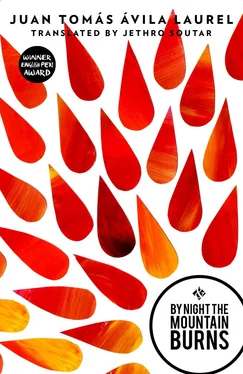Juan Ávila Laurel - By Night the Mountain Burns
Здесь есть возможность читать онлайн «Juan Ávila Laurel - By Night the Mountain Burns» весь текст электронной книги совершенно бесплатно (целиком полную версию без сокращений). В некоторых случаях можно слушать аудио, скачать через торрент в формате fb2 и присутствует краткое содержание. Год выпуска: 2014, Издательство: And Other Stories Publishing, Жанр: Современная проза, на английском языке. Описание произведения, (предисловие) а так же отзывы посетителей доступны на портале библиотеки ЛибКат.
- Название:By Night the Mountain Burns
- Автор:
- Издательство:And Other Stories Publishing
- Жанр:
- Год:2014
- ISBN:нет данных
- Рейтинг книги:5 / 5. Голосов: 1
-
Избранное:Добавить в избранное
- Отзывы:
-
Ваша оценка:
- 100
- 1
- 2
- 3
- 4
- 5
By Night the Mountain Burns: краткое содержание, описание и аннотация
Предлагаем к чтению аннотацию, описание, краткое содержание или предисловие (зависит от того, что написал сам автор книги «By Night the Mountain Burns»). Если вы не нашли необходимую информацию о книге — напишите в комментариях, мы постараемся отыскать её.
By Night the Mountain Burns — читать онлайн бесплатно полную книгу (весь текст) целиком
Ниже представлен текст книги, разбитый по страницам. Система сохранения места последней прочитанной страницы, позволяет с удобством читать онлайн бесплатно книгу «By Night the Mountain Burns», без необходимости каждый раз заново искать на чём Вы остановились. Поставьте закладку, и сможете в любой момент перейти на страницу, на которой закончили чтение.
Интервал:
Закладка:
They found that woman drowning in tears, her child held close to her chest, sprawled out in the sand. She could no longer contain herself. She’d held it all in for the whole journey, and even a good while before that, but she could no longer contain her grief; she could no longer bear to wait until she got home, as she’d planned to do. Before getting home, yet another misfortune had befallen her, another misfortune to add to her living on that island in total hardship, to her never having lived with her parents and to the only child Dios had seen fit to give her having died. Her sorrow was tremendous, and she cried for herself, and they let her cry. And she’d broken her ankle, or at least could no longer use it, and could not take her dead child home. Few people have experienced such things. Her misfortune seemed to be particularly great, for ending up without the use of your foot just when you need it most is no small thing, not something that happens every day on the island.
The people who had come to help the canoeman picked up the dead child, or the sick child, depending on how much of the story they knew, and the canoeman put the woman on his back. Then they went to the house the woman told them was hers, or that some of them already knew was hers. By midday the next day, a little coffin to bury the dead child in was ready. And because the boy was from his land, or at least half of him was, the Padre came down from the Misión and sprinkled holy water on his coffin. Then a man hoisted the coffin onto his shoulders and they took it away to be buried. Only a few people followed, people who knew the young woman, her only sister for example. The woman herself was not there. She could not attend her son’s funeral. She could not walk and there was no one strong enough to carry her on their back all the way to the cemetery. Besides, the adults on our island say that a person with broken bones should not enter a cemetery. If they do, the bones might heal wrong or not at all. And so she could not follow behind the tiny coffin of her son, Luis Mari. And while her son was taken away in that small, narrow coffin, she sat in her house crying about everything that had happened. No one stayed behind to console her. She cried in a low murmur, as if she hadn’t the strength to show the magnitude of her pain. But her tears were plentiful, so abundant that you feared for her. She cried for herself, for her solitude, for her many years of hardship, and because she’d been abandoned by Luis Mari, the only child she had.
They came back from the cemetery and waited for night to come before recalling all that had happened; to recall it, but only after dark. Because of her misfortune, someone would have given her a little kerosene to light her sad house. Then again maybe nobody had any to give, in which case her tears ran down her face and splashed on the floor in the dark. And without any light, her heart would have ached with sorrow all the more. She’d have cried for hours on end, until she fell asleep. She’d have woken up in the morning and started crying again, and the first person to talk to her would have heard a voice that was hoarse, spent and pained.
A few hours after the funeral, the canoeman who’d transported the woman and her child from the south village went back to the beach and pulled his boat to the water’s edge. When he’d mentally planned the journey, he hadn’t imagined it ending in the cemetery. Luis Mari had been laid to rest, but life had to go on. He picked up his fishing tackle, put the canoe to float and jumped in. Behind him he left much pain, but life had to go on. There was no other option. With a few strokes of the paddle he moved away from the shore, whistling out of the corner of his mouth. Any canoeman on our island, any fisherman going out to sea, respected the island custom of whistling out on the open sea. Anyone walking close to the shore, even high above sea level, would hear his whistle. They would hear him even though it was difficult to call out to land from at sea. The wind carried words off to other parts, perhaps to the mountains up above.
The canoeman planned to paddle as far out from the coast as he could and then cast out his fishing hook. He would fish until around midday and then paddle on to the south village. If during that journey he saw a little stick on the thin line of the horizon, a little stick that indicated the presence of a boat, he would change course and launch himself after it, no matter what time of day it was. If no little stick appeared on the horizon, he’d paddle on to the black stones of the south beach, pull his canoe up the beach and clean the fish he’d caught. There might not be anyone there to help him pull the canoe in, but he knew how to make a good go of it on his own and leave it beyond the scourge of the waves. Then he’d pick up his basket and go up the hill to the south village. There he’d select the best specimens and prepare a bundle of fish for the maestro. This was his duty. This way he informed the maestro of his return and allowed the maestro to share in the fish caught in his canoe.
But if a little stick appeared on the horizon confirming a boat was nearby, or far away, that young man would have pointed the maestro’s canoe towards it and set off in hope of getting something to relieve the hardship. It didn’t matter that he hadn’t rested properly after such a long night. And it didn’t matter how slim the thing was on the horizon. He would set off after it, and whether that decision proved the right one or the wrong one would depend on destiny, and it would be destiny that decided whether he ever set foot on our Atlantic Ocean island again.
Malabo, Equatorial Guinea
11th August 2008
About the Author and the Translator
Juan Tomás Ávila Laurelwas born in 1966 in Equatorial Guinea, Africa’s only Spanish-speaking country. His parents were from the remote Annobón Island, off the West African coast. His books include the novel Avión de ricos, ladrón de cerdos ( The Pig Thief and the Rich Man’s Aeroplane ) and the short story collection Cuentos crudos ( Raw Tales ). By Night the Mountain Burns , his most recent novel, is based on his memories of growing up on Annobón.
Ávila Laurel has been a constant thorn in the side of his country’s long-standing dictatorial government. A nurse by profession, he was for many years one of the best known Equatorial Guinean writers not to have opted to live in exile. But in 2011, after a week-long hunger strike in protest against Obiang’s regime, which he timed to coincide with the president of Spain’s visit to Equatorial Guinea, Ávila Laurel moved to Barcelona. He writes across all media, and is particularly active as a blogger, essayist and novelist.
Jethro Soutartranslates from Spanish and Portuguese. He has translated Argentinian and Brazilian crime novels for Bitter Lemon Press, written two non-fiction books of his own and recently co-edited The Football Crónicas, a collection of football writing from Latin America. He divides his time between London and Lisbon.
Интервал:
Закладка:
Похожие книги на «By Night the Mountain Burns»
Представляем Вашему вниманию похожие книги на «By Night the Mountain Burns» списком для выбора. Мы отобрали схожую по названию и смыслу литературу в надежде предоставить читателям больше вариантов отыскать новые, интересные, ещё непрочитанные произведения.
Обсуждение, отзывы о книге «By Night the Mountain Burns» и просто собственные мнения читателей. Оставьте ваши комментарии, напишите, что Вы думаете о произведении, его смысле или главных героях. Укажите что конкретно понравилось, а что нет, и почему Вы так считаете.












